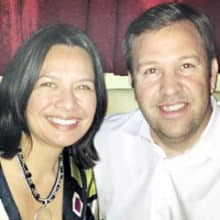

Bryan and Robin are married and often have very distinct views on the future of education, especially for their children, ages 18, 12, 4 and not quite 2. However, as researcher and education professor Michael Fullan so smartly put it, “Being right is not a strategy for change,” nor for staying married. In this monthly column, Robin and Bryan will share insights as they debate key issues in education and arrive at solutions on behalf of their children, clients, and friends in the industry. The views expressed in this column are their own, and do not reflect those of 2Revolutions nor North Carolina New Schools.
For educators and parents, there’s practicality in questioning the value and purpose of education. In our personal and professional lives, we struggle daily to discern how to best prepare young people for further education, careers and life in a world that is changing at an ever-increasing pace.
In our personal and professional lives, we struggle daily to discern how to best prepare young people for further education, careers and life in a world that is changing at an ever-increasing pace.
How do educators, mentors and families help young people navigate the myriad decisions regarding courses, activities, postsecondary education, careers? How do we encourage them to pursue success without pushing too hard, placing too much pressure? How do we help them find their voice amidst a cacophony of comparisons that make anything less than winning a full-ride scholarship or Ivy League admission seem sub par?
This month we share our perspective on some of these ideas through the lens of our journey the last few years with our oldest daughter, who is now a freshman in college, as we struggle to help her to discover and explore her interests, to find and pursue her passion, and to translate that into purposeful decisions about college and career.
Bryan: Fuel your ambition
Early on in my daughter’s education career, I noticed that she shared her Dad’s talents for the humanities and my challenges in math and science. From an educator’s perspective, I knew that her early struggles in Algebra in the eighth grade were flags in terms of limitations she would have around very competitive university admission. I was even more concerned about how this might affect her job chances in an increasingly competitive future.
I remember at the time, not being disappointed in my daughter, but disappointed in myself. Had I not read to her enough? Was I not present enough? Did the divorce affect her in a way that was deeper than my understanding?
I would teach her how to show grit and resolve and expose her to lots of interesting, ambitious people and ideas. We’d do more camps, help her take some online courses, and get her a ton of tutoring support.
At this inflection point, I should have started to think carefully about what to do with and for her in the next few years, but I went into fixing mode. I thought about my own experiences watching many of my friends attend Ivy League schools because their math SAT scores made mine look paltry, and instantly, the plan came together. I would teach her how to show grit and resolve and expose her to lots of interesting, ambitious people and ideas. We’d do more camps, help her take some online courses, and get her a ton of tutoring support.
I would fix this situation all right, and I would teach her how to rise above those thesaurus-toting zombies and one day be an advisor to them, just as I had risen above my moderately competitive college to do so.
This approach created many starts and stops over her high school career. She’d invest in people and relationships and join everything under the sun. She was president of her class and, during her senior year, of the student government for her school. She was also the captain of the girls’ soccer team.
Her heart was set on getting into UNC Chapel Hill. So when her initial SAT scores came in, I invested in SAT tutors and pushed her to enroll in more Advanced Placement courses. The journey would see me watch her cry at being overbooked and overscheduled, and she dropped out of an Advanced Placement course due to the pressure it made her feel. In many ways, I just thought it was all normal and kept a constant refrain of “this too shall pass,” and “let’s regroup, love.”
The journey would see me watch her cry at being overbooked and overscheduled, and she dropped out of an Advanced Placement course due to the pressure it made her feel.
For my daughter’s part, she drew closer to me at times and more distant in others. She wanted so desperately to please me and to be affirmed for what she did well academically and in leadership roles. Yet, at the same time she also did not want me to dwell on what might have been or how she could have addressed a situation differently.
When she did not get into her first choice for college, she was devastated for a few days. But she regrouped, made her selection, and in many ways, had an easy transition to the freshman year. Leading up to Thanksgiving of 2014, I thought she not only had chosen her dream school, but that she’d very quickly move ahead with one of the majors she had been considering: communications or international business.
And then our extended family descended on Boone, NC for a Thanksgiving visit. After a great few days with family, we had the chance to hear her thoughts on her upcoming final assignments and exams. Very quickly the conversation turned to concern. It seemed she was entering the exam period with a C average, and she really seemed to be struggling to think through how to meet deadlines and prepare herself for exams. Multiple adults, including the two authors of this blog, offered rapid-fire, intense coaching to right the ship.
As I saw her eyes start to well with tears, I quickly diverted everyone’s attention toward a movie, milkshakes and popcorn. My daughter then grabbed my hand and said, “Daddy, sit down and help me. I want you to help me.” Over the next 30 minutes we mapped out a plan.
Simply put, I was not thinking carefully again and certainly not listening to what she was trying to tell me about how she wanted to spend her summer. I found myself in full coach mode again, and my wife called timeout.
The next few weeks were amazing. She took ownership of her schedule and changed some habits around her social life. She built some muscles I had not seen in high school. Her exam period grades bore fruit with a much improved GPA, but it was the other story of her resilience that was more interesting to me. Over the Christmas holiday we had a chance to walk and talk about her future. She was zeroing in on some summer internship and job opportunities and again, I wanted her to think very clearly – What her dad would do. A flood of paid internship ideas, super connectors, and amazing women she needed to work for in multiple cities came to mind.
I was thinking for her, and I wanted to capitalize on the new grit and moxy she had built. Simply put, I was not thinking carefully again and certainly not listening to what she was trying to tell me about how she wanted to spend her summer. I found myself in full coach mode again, and my wife called timeout.
Robin: Nurture your passion
When Bryan’s daughter hit her struggles with algebra in eighth grade, I hadn’t known her very long, and I was new to the role of parent. So mostly I listened, and since math is my area, I gladly provided tutoring. When she was pulled out of algebra midyear and placed in an eighth-grade math class, I knew what her dad thought – we all knew he wasn’t happy with the decision and what it might mean for her future competitiveness.
My concern was that she find a teacher who would help her be curious about mathematics and grow in her confidence that she personally could make sense of and achieve success in math.
I wondered what she thought. As a math educator, I’m fully aware of the push for more students to take algebra by eighth-grade. I’m also all too aware that time-honored approaches to teaching algebra have turned generations off to further study of mathematics. My concern was that she find a teacher who would help her be curious about mathematics and grow in her confidence that she personally could make sense of and achieve success in math. One’s relationship with math is far more important than the accrual of course credits.
I didn’t worry about her too much in high school. She seemed to be incredibly active and involved, and her grades put her at the top of her class. More importantly, she displayed great thoughtfulness and care with her (five) younger siblings, extended family and friends. So I wasn’t quite prepared for the car ride when she shared her SAT scores – and her continued determination to go to UNC Chapel Hill.
While her dad was hiring SAT tutors and researching online Advanced Placement course options, I started asking her questions. When I asked her what interested her, I was setting myself up to have the conversation that the right school is about fit and that it didn’t make sense to set one’s heart on a school without consideration of what one wants to learn and do. Her response threw me for a loop. She very quickly replied that her dad wanted her to go into business and work her way up to CEO, and her mom wanted her to consider being an anesthesiologist. I pointed out that these were careers, but I wanted to know what she had read or seen or heard or learned that piqued her interest, her wonder, her desire to learn. She was completely stumped. She had no idea. For me, that signaled the greatest failure of an education system. She didn’t need tutors; she needed a spark!
I wanted to know what she had read or seen or heard or learned that piqued her interest, her wonder, her desire to learn. She was completely stumped. She had no idea.
In addition to talking to her about searching for that spark, listening for her inner voice, I also wanted her to know that she had a choice. If she truly wanted a shot at getting into Chapel Hill, she would need to commit to the program her dad was mapping out. However, she could also choose to enjoy her senior year, continue on her current path and set her sights on a less competitive school – and that would really be okay!
I started asking her why she liked particular schools. I once again had to work past where her dad wanted her to go, where her mom wanted her to go, to drill down to what qualities and characteristics she desired from a college. I wanted to be sure that if she didn’t get into her stretch school, she would not be completely devastated, that she would have identified other options that she knew were a good fit.
Through most of the first semester, I felt confident she’d found it. When she shared her anxieties about final papers, projects and exams over Thanksgiving, I didn’t stick to my role as listener and questioner. I just fired off advice. Good thing her dad had the Midas touch in that moment.
Since then, I’ve listened to Bryan’s phone calls with connections all over the country, trying to set up paid internships and superwoman mentors for the summer. I asked him, won’t her mom want her home for the summer? Won’t she want to spend her summer with her brother and sister and friends? What does she want to do this summer?
Common ground
The early pillow talk conversations about college were fairly tense, trying to bridge unbounded belief and support with grounded pragmatism. But through continued talk, between the two of us and with our college-bound daughter, Dad and daughter developed a spreadsheet with potential colleges down one side and various criteria and considerations across the top. We bought her a couple of books to help her populate potential schools and determine the criteria against which she would weigh them. Her weekends with us became a whirlwind of road trips for college tours.
Slowly, she started to gain clarity regarding what she wanted and did not want.
Slowly, she started to gain clarity regarding what she wanted and did not want. Following initial visits to about a dozen schools, we thought Appalachian State made the list, but it was a third choice at best. Thinking back on the visit there though, they were head and shoulders above the others in terms of what our daughter is like as a person.
The students we met were outgoing, personable, high energy, and thoughtful. They never once made her feel like she might not attend there, nor did they come across as having an agenda for admissions. Rather, they made her feel connected to something larger than herself from day one through personalized outreach.
At one point during the fall of 2014, our highly communicative daughter invested in friends and a boyfriend, and she divested in texting her dad. We took to Instragram to peek in on her life. One morning, our feeds displayed this image:


There she was, on life’s ledge. In one breathtaking moment, we were both amazed by the woman she was becoming, and at the same time, distressed by the youthful hubris and recklessness captured in this photograph. Whether incredibly brave or incredibly foolish, she’s choosing her path.
For this summer, we communicated the importance of both earning some money and getting valuable career-oriented work experience. She has arranged an internship for herself at the UVA hospital as a child life specialist to see if that’s a career she might like to pursue. And she’s going to waitress at World of Beer.
For our part, we hope she continues to take time to thoughtfully consider what she does with her choices, her body, her spirit, and her mind.
We suspect that much like we did, she will heed much of the guidance, direction, and modeling we provide, and she will also reject that which doesn’t fit who she is. For our part, we hope she continues to take time to thoughtfully consider what she does with her choices, her body, her spirit, and her mind. We also hope she thinks decisively and creatively to shape a fulfilling future.
Whether you’re a parent, an educator, a coach or mentor, we encourage you to help young people focus on what really matters. At the end of our lives, no one will remember, nor care, when we took algebra, our GPAs, or where we went to college. Rather, they’ll remember and appreciate a life lived with passion and purpose and those who helped them find their own.


